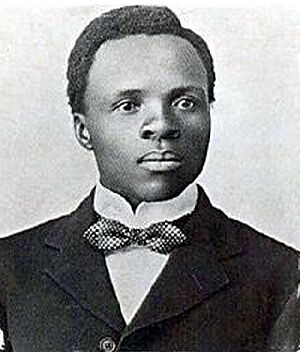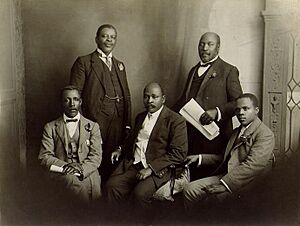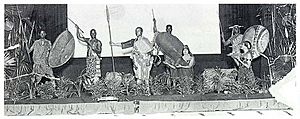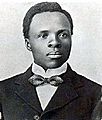Sol Plaatje facts for kids
Quick facts for kids
Solomon Tshekisho Plaatje
|
|
|---|---|
 |
|
| Born | 9 October 1876 Doornfontein near Boshof, Orange Free State
|
| Died | 19 June 1932 (aged 55) Pimville, Soweto, Union of South Africa
|
| Resting place | West End Cemetery, Kimberley |
| Nationality | South African |
| Occupation | Writer and political figure |
| Known for | Founder member of the SANNC |
| Spouse(s) | Elizabeth Lilith M'belle |
| Children | 6 |
Solomon Tshekisho Plaatje (born October 9, 1876 – died June 19, 1932) was an important South African writer, journalist, and politician. He was a very smart person who knew many languages.
Plaatje helped start the South African Native National Congress (SANNC). This group later became the African National Congress (ANC). He was also its first General Secretary. Today, places like the Sol Plaatje Local Municipality and the Sol Plaatje University in Kimberley are named after him.
Contents
Discovering Sol Plaatje's Early Life
Solomon Plaatje was born on October 9, 1876. He grew up in Doornfontein, near Boshof in what was then the Orange Free State. He was the sixth of eight sons in his family.
His family's last name, Plaatje, came from a nickname. A farmer called his grandfather "Plaatje," which means 'Picture' in Dutch. His parents, Johannes and Martha, were part of the Tswana nation. They were Christians and worked at missionary stations.
When Solomon was four, his family moved to Pniel near Kimberley. They worked for a German missionary, Ernst Westphal, and his wife, Wilhelmine. Solomon went to a mission school there. Mrs. Westphal saw how quickly he learned. She gave him extra lessons and taught him to play the piano and violin. She also gave him singing lessons.
In 1892, at age 15, he became a student teacher for two years.
Moving to Kimberley and New Skills
After school, Plaatje moved to Kimberley in 1894. He got a job as a telegraph messenger at the Post Office. He was very good at his job. He even passed a difficult government exam. He scored higher than anyone else in Dutch and typing.
At that time, men in the Cape Colony could vote if they were 21 or older. They needed to read and write English or Dutch and earn enough money. So, when Plaatje turned 21 in 1897, he could vote. Sadly, he later lost this right. This happened when the Cape Colony joined other areas to form the Union of South Africa. The new government only allowed white South Africans to vote.
Plaatje then became a court interpreter in Mafeking. He worked for the British during a difficult time called the Siege of Mafeking. He wrote a diary about his experiences, which was published after his death.
After the Second Boer War, Plaatje hoped the British would protect voting rights for all men. But the British gave power to the new South African government. This government took away voting rights from black South Africans. Plaatje was very upset by this. He wrote about it in a book that was never published.
Sol Plaatje's Important Career
Solomon Plaatje spent much of his life fighting for the rights of African people. He wanted them to have the right to vote and be free.
A Leader in Politics
He was a key founder and the first General Secretary of the South African Native National Congress (SANNC). This group later became the African National Congress (ANC). Plaatje traveled to England with other SANNC members. They went to protest against the Natives Land Act, 1913. This law took land away from black South Africans. He also visited Canada and the United States, where he met famous leaders like Marcus Garvey and W. E. B. Du Bois.
A Gifted Linguist and Writer
Plaatje grew up speaking the Tswana language. But he became a polyglot, meaning he spoke many languages. He was fluent in at least seven languages! This skill helped him work as a court interpreter. He even translated plays by William Shakespeare into Tswana.
His love for languages led him to a career in journalism and writing. He was an editor and part-owner of newspapers like Kuranta ya Becoana (Bechuana Gazette) in Mahikeng. In Kimberley, he worked on Tsala ya Becoana (Bechuana Friend) and Tsala ya Batho (The Friend of the People).
Plaatje was the first black South African to write a novel in English. It was called Mhudi. He wrote it in 1919, but it was published in 1930. He also wrote Native Life in South Africa. This book is seen as one of the most important books about Africa by an African writer. Another famous work is his Boer War Diary, published 40 years after his death.
Sol Plaatje as a Performer
Plaatje visited Britain three times. There, he met people who shared his ideas. One of them was George Lattimore, who worked in cinema and theater. In 1923, Lattimore was promoting a travel film called Cradle of the World. This show included live music and singing. Plaatje was asked to act in the show as an African tribesman.
It is believed that Plaatje took this acting role because he needed money. The show's portrayal of African culture was very simple. This suggests he might have only participated because he was in a difficult financial situation. Plaatje was from the BaRong people of the Tswana-speaking nation. He was born and raised in a Lutheran Mission.
Plaatje also made a recording of "Nkosi Sikelel' iAfrika". This is believed to be the oldest existing recording of what would become South Africa's national anthem.
Sol Plaatje's Family Life
Solomon Plaatje was a devoted Christian. He started a church group called the Christian Brotherhood in Kimberley. He was married to Elizabeth Lilith M'belle. They had six children: Frederick, Halley, Richard, Violet, Olive, and Johannes.
Plaatje died from pneumonia in Pimville, Johannesburg, on June 19, 1932. He was 55 years old. He was buried in Kimberley, and over a thousand people attended his funeral.
Sol Plaatje's Lasting Legacy
For many years after his death, Plaatje did not get the recognition he deserved. His political work was largely forgotten. Many of his writings were lost. His books were not widely read.
Renewed Interest and Awards
- 1970s: People started to become interested in Plaatje's work again. This was thanks to scholars like John Comaroff, Tim Couzens, and Stephen Gray.
- 1978: His novel Mhudi was republished.
- 1982: His important book Native Life in South Africa was republished.
- 1982: The African Writers Association created the Sol Plaatje Prose Award.
- 1984: Brian Willan published a biography about Plaatje.
- 1991: The Sol Plaatje Educational Trust and Museum opened in his former home in Kimberley. It helps keep his written legacy alive.
- 1992: His house at 32 Angel Street in Kimberley became a national monument. It is now the Sol Plaatje Museum and Library.
- 1995: The Sol Plaatje Local Municipality in Kimberley was named in his honor.
- 1998: Plaatje received an honorary doctorate after his death from the University of the North-West.
- 1998: His grave in Kimberley became a national monument. It was only the second grave in South African history to get this status.
- 2000: The Department of Education building in Pretoria was renamed Sol Plaatje House.
- 2000: The South African Post Office issued stamps featuring writers, including Plaatje.
- 2000: The African National Congress started the Sol Plaatje Award for its best-performing branches.
- 2004: He was awarded the Order of Luthuli in gold, a high honor in South Africa.
- 2005: The Saulspoort Dam was renamed Sol Plaatje Dam. This was to remember 41 Sol Plaatje Municipal workers who died there.
- 2007: The Sol Plaatje Prize for Translation was created. It awards translations into English from other South African languages.
- 2009: The Sol Plaatje Power Station was built.
- 2009: He received a Posthumous Literary Award from the South African Literary Awards.
- 2010: The first Plaatje Festival was held in Mahikeng.
- 2010: A statue of Sol Plaatje was unveiled in Kimberley by President Jacob Zuma.
- 2011: The European Union Sol Plaatje Poetry Competition began.
- 2013: The Sol Plaatje University in Kimberley was named after him. It opened in 2014.
- 2013: UNISA's Florida Campus Library was renamed the Sol Plaatje Library.
- Schools in Kimberley and Mahikeng are also named after him.
Images for kids
 | Aaron Henry |
 | T. R. M. Howard |
 | Jesse Jackson |





